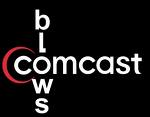by: Tom Corelis

ISP unveils changes with its new "fair share" program
Details on the successor to Comcast’s policy of “data discrimination” have emerged, and the majority of its changes will affect the ISP’s most gratuitous users.
Rather than targeting a specific protocol like BitTorrent – a policy that riled up technologists and the FCC, despite its “surgical” precision in managing consumption – Comcast’s new form of network management will kick in when it identifies a single user “disproportionately” consuming network resources, and will move to throttle their connection for a short while.
“If in fact a person is generating enough packets that they're the ones creating that situation, we will manage that consumer for the overall good of all of our consumers,”' said Comcast senior vice president and general manager of online services Matt Bowling.
Comcast says its new “fair share” system of throttling troublesome customers has so far proven to be fairly effective, particularly when the throttling stays in effect for about 10 to 20 minutes.
Once the time limit elapses, speeds revert to normal.
It doesn’t mean a throttled internet experience will be undesirable, however, as Bowling says that users experiencing limited bandwidth will still have an experience on par with “really good” DSL service.
But if a user continues a high level of consumption, “we would have to manage them again.”
It appears that Comcast customers will still enjoy an essentially unlimited bandwidth allotment; however the company says it is mulling over the possibility of charging subscribers a higher price for heavier internet use – but, it “[hasn’t] made any decisions” yet.
Anecdotal reports from users indicate that the new throttling system is already in place in some territories – and that the old policy of “data discrimination” still appears to be in effect as well.
Comcast has made no indication of the kinds of numbers that would trigger a slowdown, nor any specifics regarding the capacity available for throttled users.
Comcast, with its 14.4 million subscribers, fell into hot water last year when internet users and an AP report discovered that the company was screwing with customers’ BitTorrent activities, by essentially cutting them off as soon as a file finished downloading – a potentially toxic condition to the health of the BitTorrent network. Accusations snowballed into an FCC investigation, with both the FCC and Comcast slinging nasty words back and forth for the better part of 2008; the exchange reached its culmination earlier this month, when FCC chairman Kevin Martin officially condemned Comcast for violating the Commissions' tenets of a fair, open internet experience.
Martin also left Comcast an ultimatum, demanding that it disclose its network management practices to the public, and submit a “compliance plan” with details on what it plans to do after it disables its BitTorrent blocking, which is set to happen sometime this year. This announcement appears to satisfy the FCC’s demands.
